Have You Been Injured by the Two-Party System?
What voters say about defections, realignment, and John Morgan’s case for a new political movement
America’s political ground is shifting – in some respects gradually, in other ways in jolts.
Nowhere is this more evident than in Florida, where the political landscape has transformed dramatically over the past 20 years. Despite its brightening “red” label on most maps, Florida has extraordinary demographic and ideological diversity, making it a strong bellwether for national sentiment. This diversity isn’t always apparent on Election Day tickers, but it’s easily discerned in polling data that goes beyond candidate choice.
It's clear that Florida’s political dynamics are in flux. Over the past few months, a not-so-quiet exodus has taken shape: Prominent Florida Democrats have crossed party lines, abandoned their label, or walked away altogether.
First it was state Reps. Hillary Cassel and Susan Valdes switching to the Republican Party. Then came the sitting Senate Democratic Leader Jason Pizzo, a party standard-bearer who suddenly left party labels behind entirely, resigning his leadership position and filing as nonpartisan for a likely 2026 run for Governor.
Perhaps because of a growing dearth of Democratic leadership, the weight of Florida’s Republican Party may be getting too heavy to sustain its sizable majorities. In the absence of formidable outside opponents, GOP leaders have started eating their own.
Just last week, tensions among Republican leaders in the House and Senate led to the Florida Legislature’s failure to do its one constitutionally mandated task: Pass a budget. They’ll extend their work into the summer – but even if compromise is found, lawmakers may then face the potential wrath of Republican Governor Ron DeSantis and his veto pen.
Enter John Morgan – the bombastic personal injury lawyer known for his legal empire, populist flair, and unapologetic role in pushing for such causes as medical marijuana and a $15 minimum wage.
But this time, Morgan isn’t filing a lawsuit or promoting a ballot initiative. He’s proposing something far more ambitious: a new political party. One that isn’t fringe like the Greens, or stalled like the Libertarians (a party whose nuanced approach to certain issues may appeal to many, but whose candidates rarely gain traction). And one that’s definitely not the aimless vacuum of “no party affiliation.”
His pitch is clear: Florida needs a serious, organized alternative to the binary gridlock of red vs. blue.
At a Tiger Bay Club discussion in Tallahassee last week, Morgan floated this proposal publicly. He’s even launching a contest to name the new party, signaling that this isn’t just idle musing.
That got us wondering: Could we crowdsource ideas for naming such a party? Would Floridians even want it – and if so, why? And what about Morgan’s other somewhat radical ideas to reorganize how Florida’s legislative sessions are structured and potentially eliminate and consolidate statewide constitutional offices?
So we did what we usually do: We asked a random sample of 1,000 Florida voters what they think. Here’s what they said…
Interest in a new “third” party
Almost 2 out of every 3 voters (62%) said they’re either very (36%) or somewhat (26%) interested in supporting a new third party that’s unaffiliated with Democrats and Republicans but more purposeful and organized than the usual “independent” or “non-affiliated” designation.
Predictably, net support is especially high among those currently registered without party affiliation (76%), but also resonates strongly with Democrats (65%) and those under age 45 (66%). Presumably more content with the status quo, just 4 in 10 Republicans (39%) feel the same.
An even greater share of voters (77%) said they’d be very (48%) or somewhat (29%) likely to vote for a candidate running under a newly-formed political party if that candidate aligned with their views on government and accountability. This includes nearly all of nonpartisans (91%), more than three-quarters of Democrats (78%), and even a majority of Republicans (57%).
Three-quarters of respondents told us that their willingness to consider a third-party candidate is driven by frustration with partisan gridlock (a feeling that likely relates to national politics more than the current one-sided partisan split in Florida), and just over half said they want more nuanced solutions (55%), more moderate solutions (55%), and less “establishment” influence over policies (54%). Another 45% said they simply want more competitive elections.
But the main reason respondents gave for their willingness to embrace a third party was more descriptive than explanatory: dissatisfaction with both major parties.
Thankfully, we asked them: How so?
Roots of partisan dissatisfaction
We asked all respondents to indicate in which areas (if any) they feel the Democratic Party has veered too far “left” or is failing to represent most people, followed by the same question on perceptions of the Republican Party’s shift too far “right.”
In the analysis, we focused on responses from same-party and nonpartisan voters – in other words, what portion of Republicans and NPAs are frustrated with the GOP, and conversely, how do Democrats and NPAs feel about the leadership and platforms of the left.
Here’s what we found: Nearly half of Democrats (46%) and a solid majority of nonpartisans (57%) believe the Democratic Party has veered too far left in at least one respect, including:
44% - Too much protection for transgender athletes over the rights of female athletes (35% of Democrats and 53% of NPAs)
33% - Too much focus on protecting illegal immigrants over protecting American citizens from crime (15% of Democrats and 51% of NPAs)
33% - Too much focus on DEI over merit-based employment and advancement (15% of Democrats and 51% of NPAs)
23% - Too much support or sympathy for Hamas / Palestine over the plight of Israeli hostages / Jewish victims of terrorism (13% of Democrats and 40% of NPAs)
14% - Too much support for environmental policies over goals of economic development (2% of Democrats and 27% of NPAs)
On the red side of the aisle, 43% of Republicans and 85% of nonpartisans see at least one area where the party has veered too far right, including:
45% - Too much resistance to marijuana legalization over public support for recreational use (22% of Republicans and 62% of NPAs)
39% - Too much loyalty to Donald Trump over embracing decentralized, independent leadership (20% of Republicans and 65% of NPAs)
39% - Too much emphasis on protecting unborn children over the medical needs of pregnant women (including 23% of Republicans and 60% of NPAs)
33% - Too much support for gun rights without investing more heavily in mental health or violence prevention (15% of Republicans and 56% of NPAs)
25% - Too much support for tax cuts and deregulation over maintaining public services (11% of Republicans and 43% of NPAs)
So, what should Morgan call his party?
John Morgan is crowdsourcing the name for his new political party, and so did we. We asked our respondents to choose names they’d consider to be fitting for a modern, credible third party. From a list of about 17 options, these rose to the top:
22% - The Centerline Party
18% - The Reason Party
17% - The Practical Party
16% - The Main Street Party
15% - The Civic Renewal Party
13% - The Future Party
But we also asked respondents to submit their own ideas beyond our list – and those results paint a far more colorful picture of desires, frustrations, and goals than offered by our somewhat sanitized list. The most popular submissions included a few that we had advanced, but many others we hadn’t (or, to be clear, wouldn’t have) considered:
The Common Sense Party
The Florida First Party (driven mostly by MAGA-leaning respondents)
The People’s Party (sorry, but I think China and North Korea can keep that one)
The Unity Party
The Honesty Party
The Moderate Party
The Constitutional Party
The Adults (yes, really – multiple people wrote this – and it has a ring to it)
The Sanity Is Here Party
The Skink Party (did Carl Hiaasen take our poll?)
And, of course, a few submitted “Beach” and “Block” – which, frankly, could have legs.
Even with such a wide range of ideas offered up, the message is pretty clear: Floridians want a party that feels rooted in reason, not rage.
What do voters think about elected “party switchers” so far?
As for recent Democratic Party defectors – such as Cassel, Valdes, and Pizzo, voters are equally divided on what this means: Half (50%) believe the moves are self-serving to seek more personal power or relevance in a Republican-controlled Legislature, while the other half (50%) feel these individuals are expressing earnest frustration with what they see as an ineffective or unresponsive Democratic Party that is failing to represent the needs of voters.
Not surprisingly, the view of the switchers as self-serving is held by a strong majority of Democrats (71%), while the same portion of Republicans (70%) ascribe more noble motivations.
Most telling is the view of the most likely group of “third-party” embracers – nonpartisans – among whom 58% see these defections as indicative of the Democratic Party’s failure to represent their needs.
Beyond party, a few thoughts on government in general
At the Tiger Bay event, attorney Morgan didn’t stop at launching a party. He floated two other bold ideas that would restructure how Florida government is organized or operates:
Switching Florida to a biennial legislative session — meaning lawmakers would meet every other year, not annually.
Eliminating or consolidating statewide constitutional offices (such as Lieutenant Governor and Commissioner of Agriculture).
These ideas don’t seem to be likely winners, however.
Just 9% support the idea of a biennial session – about the same portion (10%) who believe such a change would improve government efficiency. The remaining 90%, on the other hand, believe yearly legislative sessions are necessary to address urgent issues and keep lawmakers connected to their constituents' preferences.
As for eliminating or consolidating some constitutional offices,fewer than one-quarter (24%) believe such a move would effectively reduce bloat and improve government efficiency, while more than half (52%) say these offices should remain separate and directly accountable to voters. The remaining 24% are unsure.
What now?
George Washington warned against a two-party system, but in some respects it’s worked quite well: When the pendulum of power between the two parties stays fairly close to the center of the clock, voters can make rational choices between platforms and each side can keep the other largely in check.
But to John Morgan – and, it turns out, a meaningful share of Florida voters – it might be time to yank the entire clock off the wall.
Morgan has money, name recognition, and a track record of doing things his way. He’s not waiting for permission, but he does seem to be asking for input, testing the water on whether Florida voters are ready to rewrite the political script – not with another protest vote, but with a party that could seriously compete.
If nothing else, it’s a wake-up call to both major parties, here in the Sunshine State and beyond.





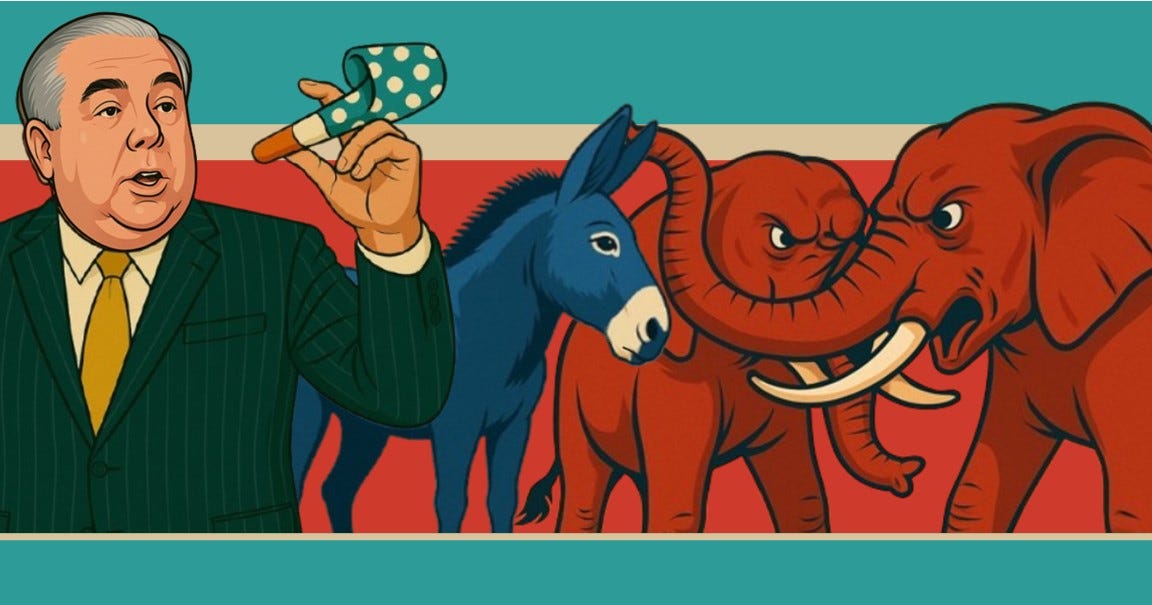


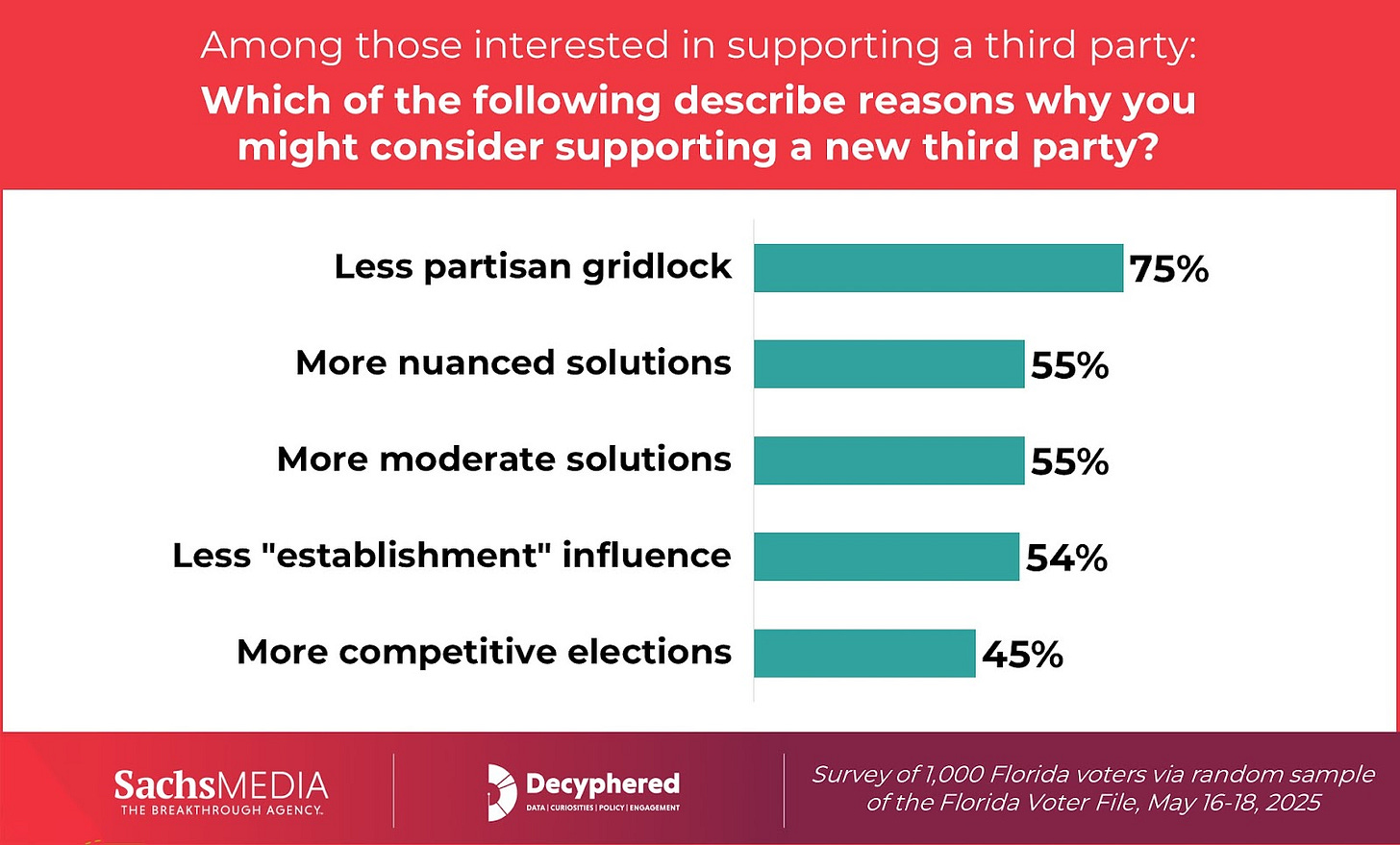
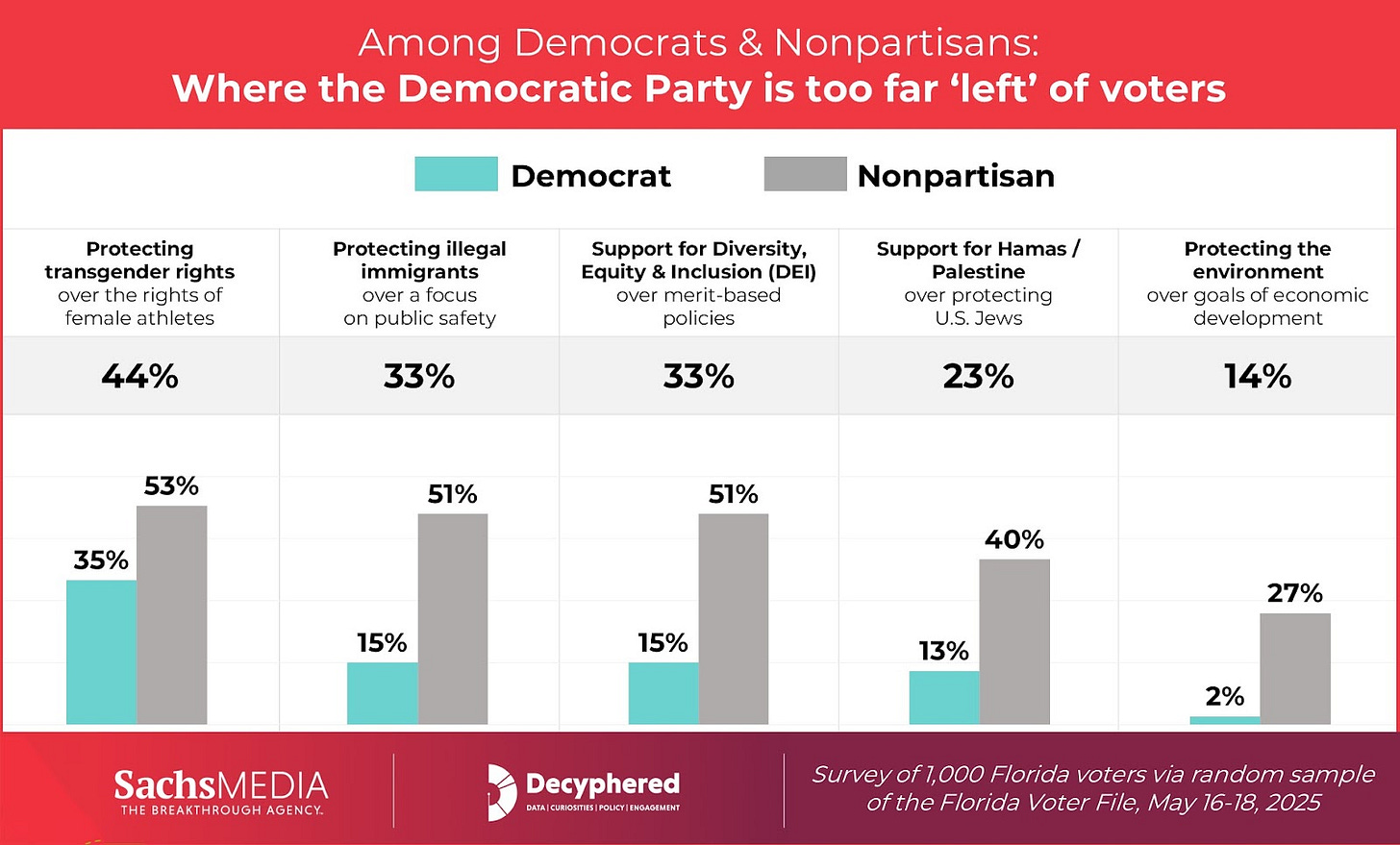

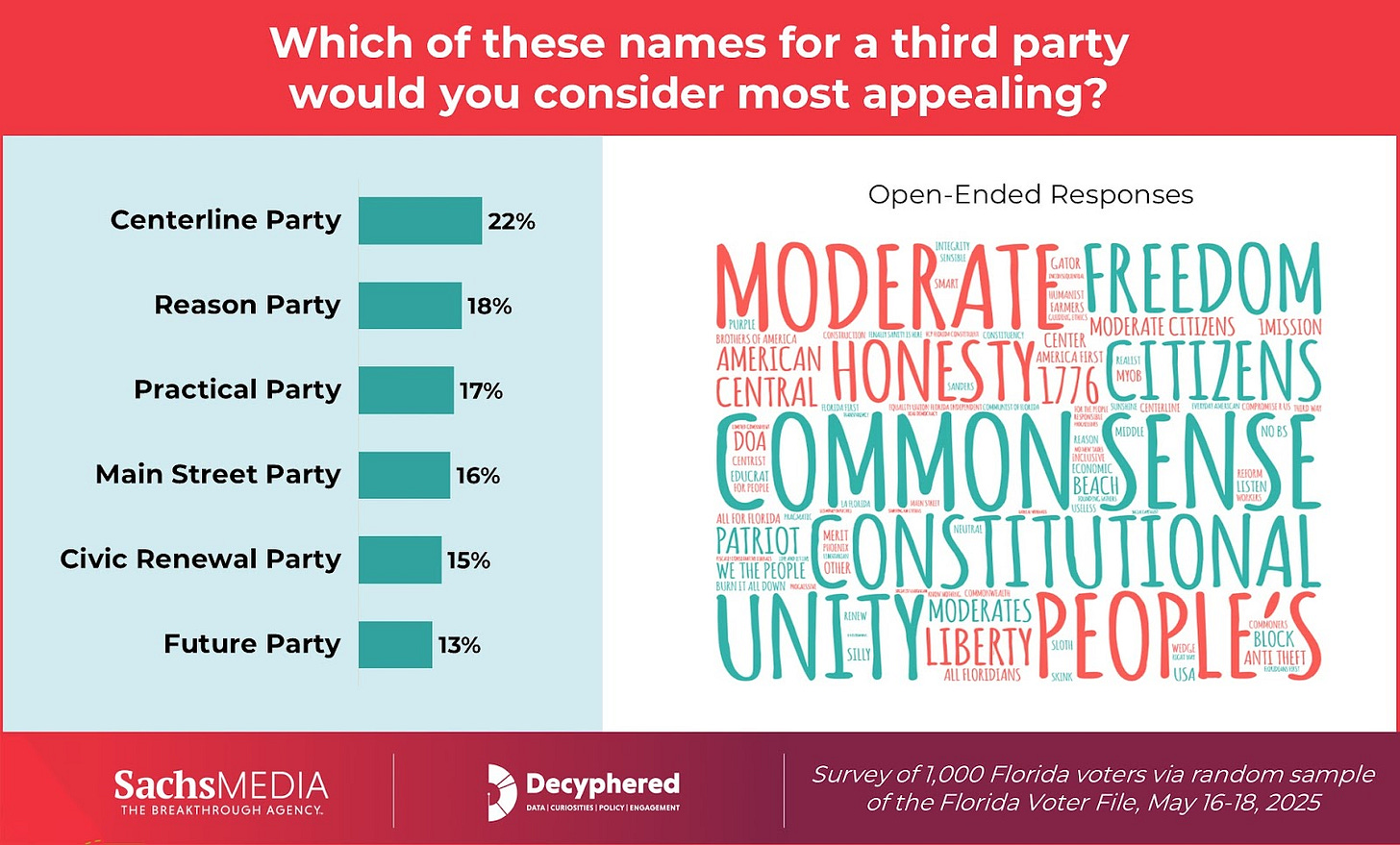
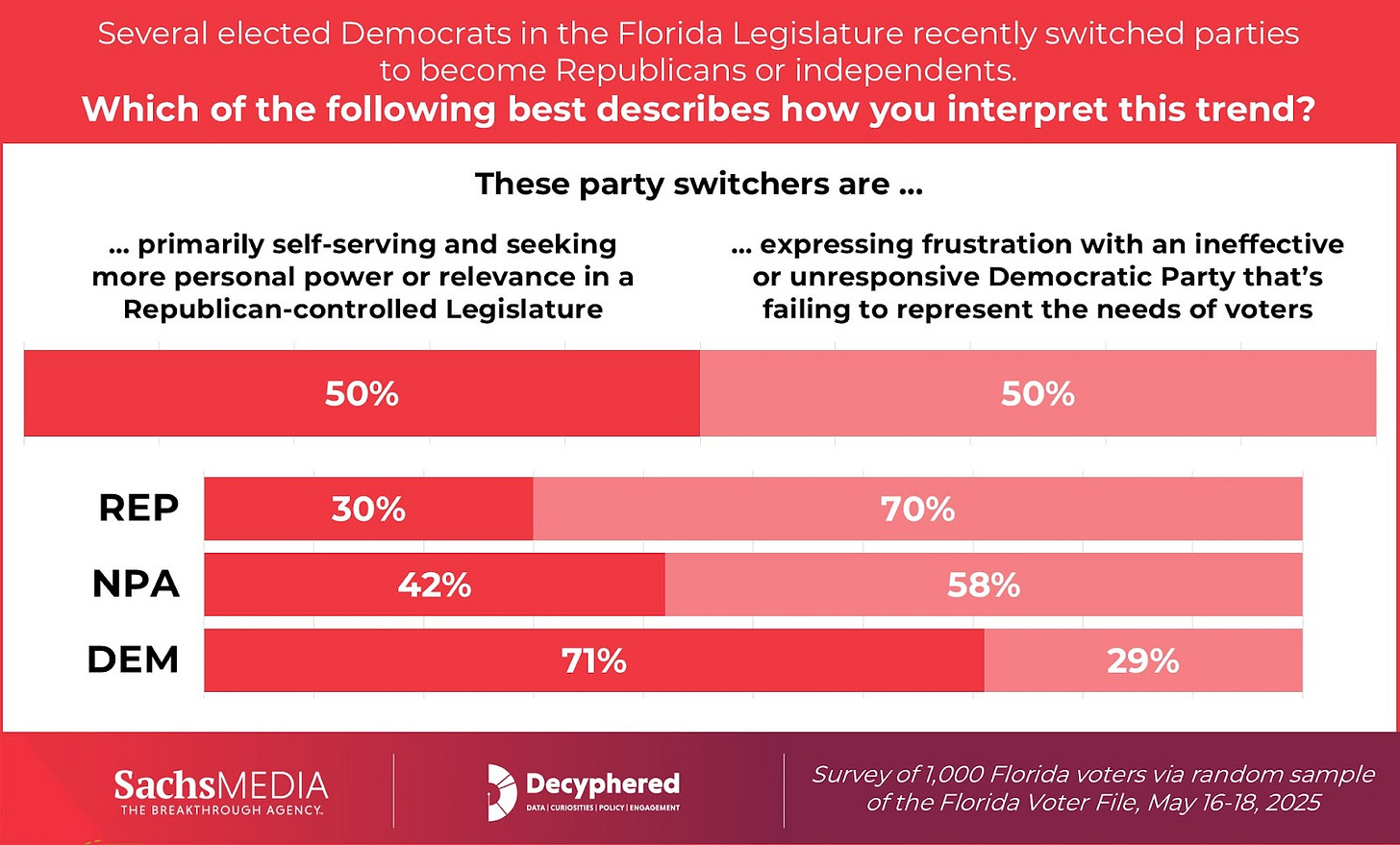


Very nice as always Karen. I would call it the "Fringless Party". It's the kooks on both sides that wreck it for me and the average person, as your data show. Every trip to the voting booth is a question of who throws the fewest poison pills, which has been really easy in the last decade.
Amen. The parties have sold out to their most divisive and radical elements. Either would burn the country to the ground in order to govern the ashes.